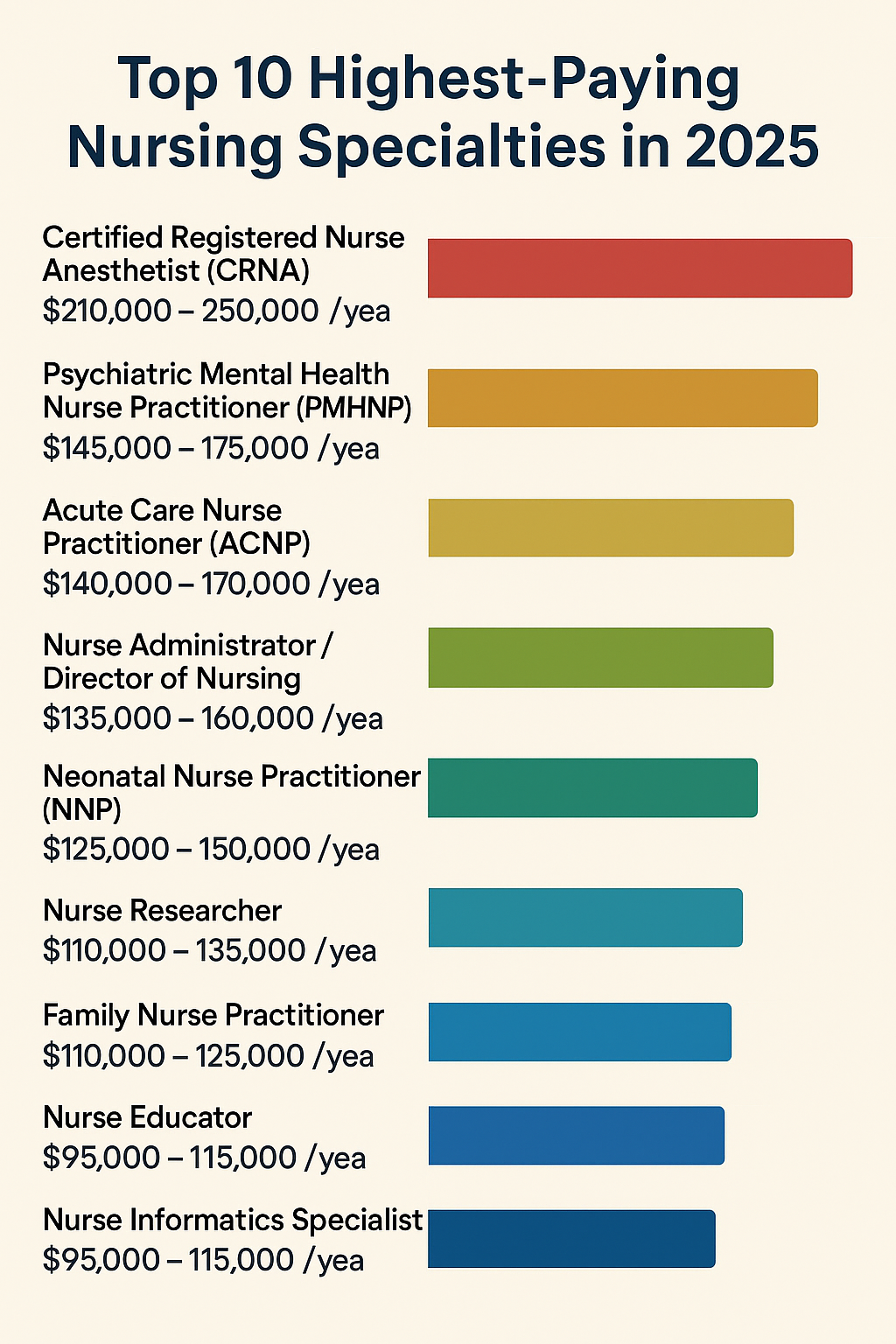If you’ve ever sat in the breakroom sipping hospital coffee (a.k.a. burnt bean water) and wondered, “Am I getting paid enough to survive another 12-hour shift?” — you’re not alone.
Nursing is a calling, but it’s also a career. And in 2025, the nursing landscape is shifting: more demand, more burnout, but also more opportunity. If you’re career-minded (or just dreaming of finally upgrading your car that still has the nursing school bumper sticker), you’ll want to know which specialties are paying top dollar.
Here’s your ultimate guide to the 10 highest-paying nursing specialties in 2025 — complete with updated salary ranges, career outlook, education requirements, and the real-life pros and cons nurses talk about at 3 a.m. during charting marathons.
1. Certified Registered Nurse Anesthetist (CRNA)
- Average Salary (2025): $210,000 – $250,000/year
- Top 10% Earn: Over $280,000/year in major metro areas (New York, San Francisco, Boston)
- Education Needed: MSN or DNP in Nurse Anesthesia
- Job Growth: 9% expected through 2030 (BLS)
(Source: American Association of Nurse Anesthesiology)
Why It Pays: CRNAs are the ultimate specialists in anesthesia. They keep patients safe during surgery, labor, trauma cases, and critical care procedures. In rural areas, they often provide anesthesia without a supervising anesthesiologist.
Pros:
- Top salary across the entire nursing field.
- High autonomy and professional respect.
- Demand is especially strong in surgical centers and rural hospitals.
Cons:
- Programs are extremely competitive.
- ICU experience (2–3 years) is required before you can even apply.
- High stress: mistakes are not an option when patients are under anesthesia.
💡 NurseThoughts Humor Take: If you’ve ever titrated levophed while updating Epic with one hand and holding a bedpan with the other, you might just have the focus it takes to be a CRNA.
2. Psychiatric Mental Health Nurse Practitioner (PMHNP)
- Average Salary (2025): $145,000 – $175,000/year
- Top States Paying Highest: California, Massachusetts, Oregon
- Education Needed: MSN or DNP, PMHNP certification
- Job Growth: 40% growth projected by 2032 (BLS)
(Source: American Psychiatric Nurses Association)
Why It Pays: The mental health crisis in the U.S. continues to climb. PMHNPs provide therapy, prescribe medications, and manage care in both in-person and telehealth settings.
Pros:
- Skyrocketing demand = job security.
- Telehealth options allow for flexibility and remote work.
- Patients are deeply grateful for help in an underserved field.
Cons:
- High emotional toll — compassion fatigue is real.
- Long waitlists = relentless patient demand.
- May face resistance in certain practice settings.
💡 Humor Take: Imagine a full day of hearing about family trauma — then going home to your kids arguing about who ate the last granola bar. Double shift.
3. Acute Care Nurse Practitioner (ACNP)
- Average Salary (2025): $140,000 – $170,000/year
- Top 10% Earn: $185,000+ in urban trauma centers
- Education Needed: MSN or DNP, ACNP board certification
- Job Growth: Strong growth with aging population and ICU demand
(Source: American Association of Nurse Practitioners)
Why It Pays: ACNPs manage critically ill patients in ICUs, ERs, and specialty surgical units. They handle rapid decision-making, procedures, and complex care plans.
Pros:
- Thrilling, high-intensity environment.
- Strong salaries with night/weekend differentials.
- Respected role among medical teams.
Cons:
- Stress levels can rival your caffeine intake.
- Long hours and night shifts common.
- Burnout risk is high without strong support systems.
4. Nurse Administrator / Director of Nursing
- Average Salary (2025): $135,000 – $160,000/year
- Top 10% Earn: $180,000+ in large hospital systems
- Education Needed: MSN, DNP, or MBA in Healthcare Leadership
- Job Growth: Steady growth due to staffing shortages and turnover
(Source: American Organization for Nursing Leadership)
Why It Pays: Nurse administrators are the backbone of healthcare operations. They manage staffing, compliance, budgets, and quality outcomes.
Pros:
- Mostly Monday–Friday schedules.
- Ability to improve systems and impact many patients indirectly.
- Bonus potential at executive levels.
Cons:
- Paperwork and meetings galore.
- You’re the go-to person for every staffing crisis.
- Disconnect from bedside nursing may be tough for some.
💡 Humor Take: The famous phrase “my door is always open” is ironic, since you’re never in your office — you’re always stuck in another meeting.
5. Neonatal Nurse Practitioner (NNP)
- Average Salary (2025): $125,000 – $150,000/year
- Highest Paying States: New York, California, Texas
- Education Needed: MSN or DNP with neonatal track
- Job Growth: High, with steady NICU demand nationwide
(Source: National Association of Neonatal Nurses)
Why It Pays: Caring for the tiniest, most fragile patients requires specialized skill and advanced training.
Pros:
- Deeply rewarding when babies thrive.
- Growing demand in children’s hospitals.
- High-tech NICUs mean constant learning.
Cons:
- Emotional weight is enormous.
- High stress with critical patients.
- Competitive job market in desirable metro hospitals.
6. Nurse Researcher
- Average Salary (2025): $110,000 – $135,000/year
- Top Employers: Universities, NIH, pharmaceutical companies
- Education Needed: MSN or PhD in Nursing Science
- Job Growth: Moderate growth, with grant-dependent funding
(Source: National Institute of Nursing Research)
Why It Pays: Nurse researchers design and lead studies that advance nursing practice, improve patient outcomes, and shape healthcare policy.
Pros:
- Standard weekday schedules.
- Contribute to science and evidence-based practice.
- Opportunity to publish, teach, and speak at conferences.
Cons:
- Funding and grants can be unstable.
- Less direct patient interaction.
- Writing and data analysis heavy.
7. Family Nurse Practitioner (FNP)
- Average Salary (2025): $110,000 – $125,000/year
- Top 10% Earn: $135,000+ in private practice
- Education Needed: MSN or DNP, FNP certification
- Job Growth: Very strong — FNPs remain the most in-demand NP specialty
(Source: Bureau of Labor Statistics)
Why It Pays: FNPs provide broad-spectrum primary care for patients of all ages.
Pros:
- Flexibility across clinics, urgent care, telehealth.
- In-demand in rural and underserved areas.
- Long-term relationships with patients.
Cons:
- Salary is lower compared to PMHNPs or ACNPs.
- Patient loads can be overwhelming.
- Sometimes treated like “catch-all” providers.
8. Nurse Educator
- Average Salary (2025): $95,000 – $115,000/year (higher in universities with tenure)
- Education Needed: MSN, DNP, or PhD
- Job Growth: Major demand due to nursing faculty shortages
(Source: American Association of Colleges of Nursing)
Why It Pays: Nurse educators prepare the next generation of RNs and NPs. With a critical shortage of faculty, salaries are rising.
Pros:
- Influence future nurses.
- Academic schedules often lighter than bedside.
- Opportunities to teach, research, and mentor.
Cons:
- Pay can still trail behind advanced practice roles.
- Academic politics can be frustrating.
- Endless “When is this assignment due?” questions.
9. Nurse Informatics Specialist
- Average Salary (2025): $95,000 – $115,000/year
- Top Employers: Hospitals, EHR vendors, consulting firms
- Education Needed: BSN + informatics certification or MSN
- Job Growth: Fast growth with increasing healthcare tech reliance
(Source: Healthcare Information and Management Systems Society)
Why It Pays: These nurses translate bedside workflows into IT solutions. They improve EHR systems, analyze data, and streamline processes.
Pros:
- Many positions are remote or hybrid.
- Stable weekday schedules.
- You help create systems nurses don’t hate (hopefully).
Cons:
- Can feel disconnected from patients.
- Constantly adapting to new technology.
- You become the unofficial “help desk” for cranky coworkers.
10. Certified Nurse Midwife (CNM)
- Average Salary (2025): $90,000 – $115,000/year
- Education Needed: MSN or DNP in Nurse Midwifery
- Job Growth: Increasing demand with rise of birthing centers
(Source: American College of Nurse-Midwives)
Why It Pays: CNMs provide holistic prenatal, birth, and postpartum care. They blend medical expertise with personal, empowering patient experiences.
Pros:
- High patient satisfaction.
- Growing acceptance of midwifery care.
- Deep, personal connections with families.
Cons:
- On-call lifestyle = zero predictability.
- Emotional and physical toll.
- Insurance reimbursement issues in some states.
Salary Differences by State & Region
Not all nursing salaries are created equal. A CRNA in rural Kansas won’t earn the same as one in San Francisco. Cost of living, unionization, and demand all play a role.
Highest-Paying States for Nurses (2025 averages):
- California
- New York
- Massachusetts
- Oregon
- Washington
Tip: Always factor in cost of living. A six-figure salary in California might stretch less than a smaller paycheck in Texas or Florida.
How to Break Into High-Paying Specialties
- Get the Right Experience – Many specialties (like CRNA or ACNP) require ICU or ER experience first.
- Invest in Education – Advanced practice roles require MSN or DNP preparation.
- Earn Certifications – Specialty certs (CCRN, CEN, PMHNP, etc.) help you stand out.
- Network – Join associations (AACN, ANA, specialty groups).
- Consider Location – Urban and high-cost states usually pay more.
Tips to Boost Your Nursing Salary Without Changing Specialties
- Pick up per diem shifts or travel assignments.
- Get certified in your area of practice.
- Take leadership opportunities like charge nurse.
- Negotiate! According to BLS, many nurses never negotiate their starting salary — and leave money on the table.
Final Thoughts
Nursing is one of the most versatile careers on the planet. In 2025, whether you want to run the OR as a CRNA, guide fragile patients as a PMHNP, or revolutionize charting as an informatics specialist, the opportunities (and salaries) are growing.
The best part? You don’t have to stay locked into one role forever. Nursing careers evolve just like we do. And while money isn’t everything, knowing your worth — and where your career could take you — is powerful.
So grab that burnt breakroom coffee, update your resume, and start plotting your next move. Your future paycheck (and maybe your sanity) will thank you.





